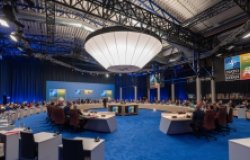Building Peace and Democracy in Macedonia
His Excellency Nikola Dimitrov, Ambassador of the Republic of Macedonia to the United States
Overview
Summary of the East European Studies discussion with Nikola Dimitrov, Ambassador of the Republic of Macedonia to the United States.
Macedonia represents the last best hope for the Balkans, and its progress should serve as an example for the rest of the region, asserted Ambassador Dimitrov. If Macedonia fails in its efforts to develop inter-ethnic democracy, the whole Western policy in the Balkans will fall apart. Despite the violence during 2001, Macedonia has worked to ensure human rights and achieve a multiethnic democracy, and its achievements have been both recognized and applauded by the international community.
Among its accomplishments, Macedonia enjoys an impressive human rights record compared to the other Balkan states, its laws and constitution have been praised by the international community, and it has shown that multi-ethnic democracy is possible. Consequently, many Macedonians were confused about the reasons for the violence in 2001 that was caused by the efforts of ethnic-Albanian guerilla bands, calling themselves the National Liberation Army (NLA), to seize military control of Albanian-dominated regions in western Macedonia along the border with Kosovo. Polls conducted in 2000 by the UNDP had demonstrated that over 60% of the ethnic Albanian population of the country (according to the last census approximately 23% of the population in Macedonia is ethnic Albanian) were generally satisfied with their position. Albanian officials controlled three ministries in the Macedonian government. Ambassador Dimitrov asked rhetorically if the violence could have been instigated from abroad, from Kosovo, or represented an intra-Albanian fight or an effort to control territory within Macedonia. He stated his personal view that the main cause of the violence in Macedonia in 2001 was the continuing instability and unresolved problems in Kosovo. Grave human rights abuses occurred during the six to seven month period in 2001; however, few (approximately 30) people were killed.
The political leadership should be credited with the low level of violence that occurred during this time as a result of its decision to avoid civil war and to negotiate a political settlement at Ohrid in August 2001. Among the concessions, the constitution and preamble were changed and laws regarding police force composition, quotas for representation in government, and language use in state structures were amended.
The parliamentary elections held this past weekend on September 15 were widely praised by the international community which monitored them and resulted in a change of government, with the Social Democrats headed by Branko Crvenkovski taking the largest portion of the votes among Slav Macedonians. Ali Ahmeti the former leader of the NLA forces emerged as the largest vote-getter among Albanians. While Ahmeti had been quoted in his fighting days in 2001 as saying the aim of the NLA is to "remove Slavs from Albanian-controlled territory," the prospects for a grand coalition between the two victorious parties is possible.
The international community must create long-term policy in the Balkans that will encompass the interests of each of the states there. The Balkans has its own peculiarities, which means that general frameworks and strategies are insufficient in addressing this region's challenges. Above all, Ambassador Dimitrov emphasized, international peacekeeping forces must remain for a limited period and borders must not be changed. He also cited the need for assistance in training Macedonia's special forces (consisting of both Macedonians and Albanians) to fight guerrillas, and continued economic aid. Both sides - ethnic Albanians and ethnic Macedonians - must work together to develop institutions and move towards NATO and EU integration.
Hosted By

Global Europe Program
The Global Europe Program is focused on Europe’s capabilities, and how it engages on critical global issues. We investigate European approaches to critical global issues. We examine Europe’s relations with Russia and Eurasia, China and the Indo-Pacific, the Middle East and Africa. Our initiatives include “Ukraine in Europe” – an examination of what it will take to make Ukraine’s European future a reality. But we also examine the role of NATO, the European Union and the OSCE, Europe’s energy security, transatlantic trade disputes, and challenges to democracy. The Global Europe Program’s staff, scholars-in-residence, and Global Fellows participate in seminars, policy study groups, and international conferences to provide analytical recommendations to policy makers and the media. Read more
Thank you for your interest in this event. Please send any feedback or questions to our Events staff.










